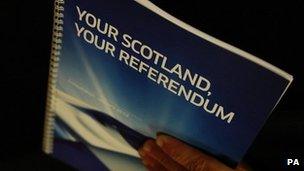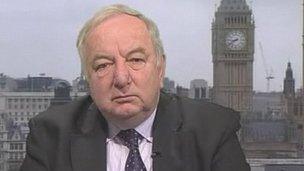Scottish independence: Peer's 'double referendum' bid
- Published

Two referendums would only be held if people in Scotland rejected independence
A former Scotland Office minister is calling for a "double referendum" to determine Scotland's constitutional future.
Labour peer Lord Foulkes has said there should be two separate votes - the first one to decide on independence.
If that vote was defeated, a second ballot could be held on further devolution.
Lord Foulkes has tabled an amendment to the Scotland Bill, external proposing the measure.
The bill - which is designed to implement the proposals of the Calman Commission, external to increase the powers of the Scottish Parliament - is being debated in the House of Lords later.
Last week, Scotland's First Minister Alex Salmond set out the question he intends to ask in the referendum on independence which he wants to hold in autumn 2014.
However, the SNP leader, who is holding a consultation on the referendum process, has said that he does not rule out a second question on the so-called Devo Max option, which could see Scotland being given fiscal autonomy.
The UK government has insisted that the referendum should be a single question on whether the Scottish people want independence.
Lord Foulkes, who was a Scotland Office minister in Tony Blair's Labour government, said many people were confused about what question or questions would be put on the ballot paper.

Lord Foulkes wants an amendment to be made to the Scotland Bill
The former MP for Carrick, Cumnock and Doon Valley argued it would be better to split the issues.
He said if people in Scotland voted for independence there would be no need for another referendum.
But if the idea was rejected, then a second vote could be held about a month later to decide what extra devolution powers the country should have.
Lord Foulkes told BBC Radio Scotland's Good Morning Scotland programme: "Well there has been a lot of discussion about two questions at the one time on the one ballot paper, or two ballot papers, making the decision simultaneously and that would confuse things.
"The first question is should Scotland remaining part of the UK. If Scotland is going to become an independent country then the question of devolution and the extent of devolution doesn't arise.
Lord Foulkes: "How can you make a decision about how much devolution when you don't know whether Scotland is going to remain in the UK - is that logical."
"But if Scotland remains part of the United Kingdom then we have a second question which says how much devolution do you want - I actually want more devolution, I want more fiscal autonomy, full fiscal responsibility.
"But you can't make a decision about that until you know whether Scotland is going to remain part of the UK. How can you make a decision about how much devolution when you don't know whether Scotland is going to remain in the UK - is that logical?"
Another amendment to the Scotland Bill will attempt to stop Scottish universities charging students from the rest of the UK up to £9,000 a year to study in Scotland, while other EU students pay nothing.
A number of peers have said the present system is ''discriminatory" and their amendment calls for an end to the practice.
Although peers are debating the bill on Thursday, the proposals will not be considered until after the UK government's consultation exercise has concluded.